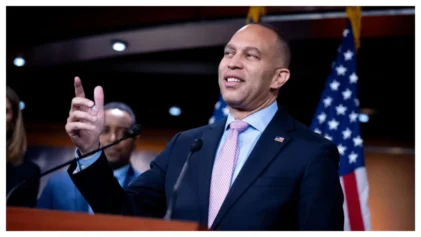After the identity of the suspect who rammed his car into a security barrier at the United States Capitol building, killing one Capitol Police officer, was identified as a man who appears to have been a follower of Minister Louis Farrakhan, some leaders have challenged attempts to tie the deadly attack to the longtime head of the Nation of Islam.
On Friday, a suspect identified as 25-year-old Noah Green of Virginia Beach was fatally shot by Capitol Police on April 2 after he emerged from the crashed vehicle with a knife.
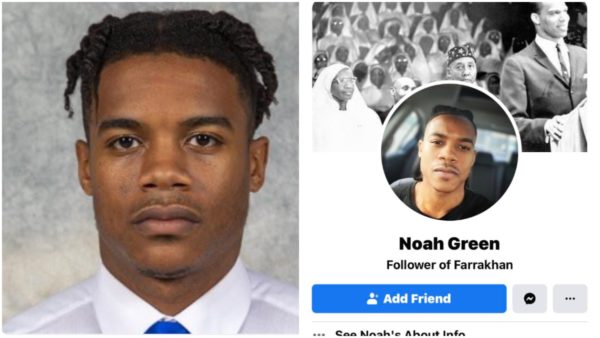
The attack resulted in the death of officer William “Billy” Evans, an 18-year veteran of the U.S. Capitol Police Department, and left a second officer injured.
Green played football at Christopher Newport University and graduated in 2019 with a degree in finance. Posts on his Facebook account show that Green had become increasingly supportive of Farrakhan and the Nation of Islam prior to his death. In his bio on Facebook, Green described himself as a “Follower of Farrakhan.”
Metropolitan Police Chief Robert J. Contee III said Green’s attack did not “appear to be terrorism-related.”
On Twitter, some right-wing users emphasized Green’s links to Farrakhan as outlets like The New York Times published stories with headlines linking Green to the religious leader.
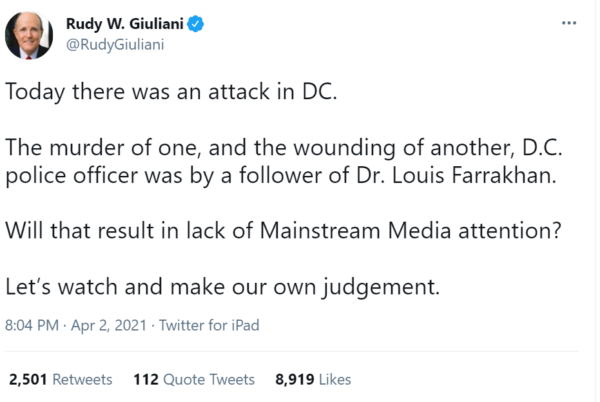
Conservative activists quickly compared the attack to the Jan. 6 Capitol riot that left five people dead and questioned whether Farrakhan would be held accountable for the incident. Former President Donald Trump’s rhetoric before and during the riot was criticized by many as encouraging the mass insurrection in which his supporters infiltrated and stormed the Capitol building while lawmakers were in the process of certifying the presidential election vote. Trump had spent weeks pushing the false narrative that the election was stolen from him and was riddled with voter fraud.
After the riot, Trump’s Twitter account was banned. He’d used the account just hours earlier to share a recorded message in which he told the insurrectionists, “We love you.” In January, Trump became the first president to be impeached twice when he was charged with “incitement of insurrection.”
Following Friday’s attack, some activists questioned whether Farrakhan’s account would be banned too. The 87-year-old had led the Nation of Islam since 1977. Farrakhan has nearly 350,000 followers on Twitter and often posts short clips of speeches. His Facebook account was banned in 2019 over the platform’s policies on violence and hate.
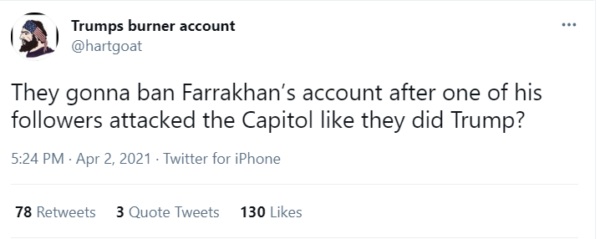
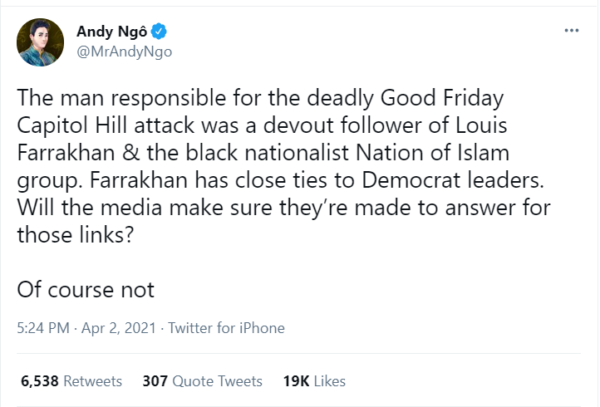
Trump’s incitement of the Capitol riot wasn’t the first time a conservative leader’s comments have resulted in followers taking violent action. Conspiracy theorist Alex Jones apologized in 2017 after a North Carolina man drove to the Washington, D.C. pizzeria Comet Ping Pong to “self-investigate” the radio host’s allegations that the restaurant was involved in the “pizzagate” conspiracy theory which purported that the restaurant was involved in a child sex ring.
While The New York Times pointed out Farrakhan has been accused of anti-Semitism in the past, Green’s attack on the Capitol doesn’t appear to be connected to anything related to the Jewish faith.
Benton Harbor, Michigan, Mayor Marcus Muhammad cited the 1995 Million Man March called by Farrakhan as an example of a large-scale, nonviolent demonstration, and asked, “Who’s really teaching the hate?”
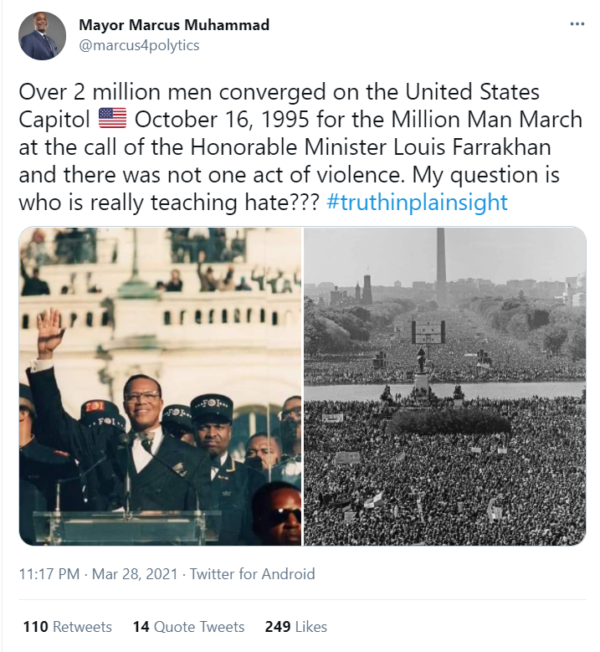
Bishop Talbert Swan, president of the Springfield chapter of the NAACP, similarly pointed out the differences between the Million Man March associated with Farrakhan and the Capitol riot.
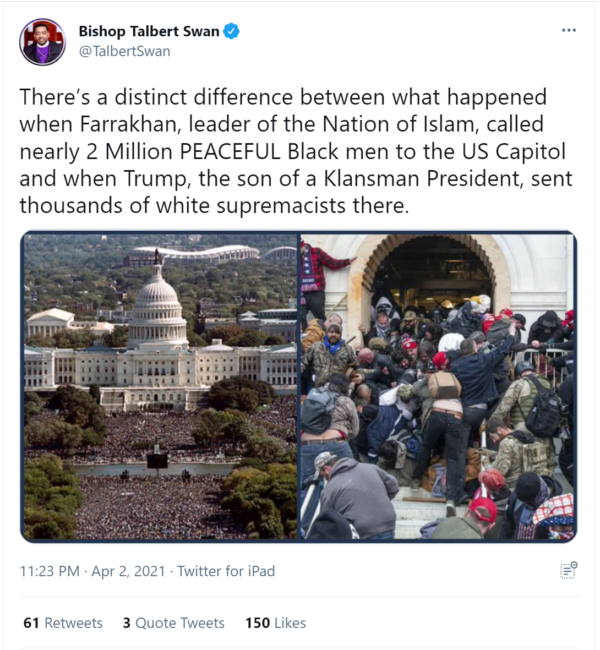
Another user said Farrakhan shouldn’t be held responsible for the attack or compared to Trump.
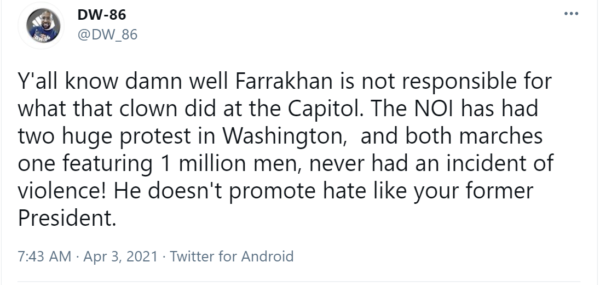
Leaders who have spoken positively about Farrakhan also were targeted by right-wingers after the attack. Alt-right activist and conspiracy theorist Jack Posobiec, who has over 1 million Twitter followers, wrote in in one Tweet following the attack, “FLASHBACK: Warnock Praised Farrakhan’s Nation Of Islam In 2013: An ‘Important’ Voice,” and included a link to a December article from conservative outlet Daily Wire about Warnock’s comment on the Nation of Islam.
“Well, the Nation of Islam is significant, but its numbers don’t come anywhere near the membership of our churches. Its voice has been important, and its voice has been important even for the development of black theology,” Warnock, Georgia’s first Black senator, said in 2013 in response to an audience member’s question. “Because it was the Black Muslims who challenged black preachers and said you’re promulgating, you know, they called, ‘the white man’s religion. And that’s a slave religion; you’re telling people to focus on heaven meanwhile they’re catching hell.’”
Friends of Green, who was born in West Virginia, described him as a popular athlete. On the biography page for his school’s football team, Green said the person in history he most wanted to meet was Malcolm X.
“I know people say this all the time, but the guy who I played with is not the same person who did this,” said Andre Toran, the captain of the football team at the time Green played.
Toran shared a Facebook post by Green in which he expressed that he’d recently experienced symptoms of mental illness, including paranoia, depression and suicidal ideation. In the post, Green accused his roommates of drugging him.
Lately, Green has also made more posts expressing support for the Nation of Islam. Green wrote on Facebook about the “end times” and said he had searching for a “spiritual journey.”
“To be honest these past few years have been tough, and these past few months have been tougher,” he wrote. “I have been tried with some of the biggest, unimaginable tests in my life. I am currently now unemployed after I left my job partly due to afflictions, but ultimately, in search of a spiritual journey.”
Court records show Green filed a name change petition in Indiana in December and wanted to change his name to Noah Zaeem Muhammad. However, he never showed up for the hearing.
Green’s brother Brendan told The Washington Post the athlete’s mental health had worsened in recent years and that his brother told him he’d been suffering from hallucinations. His unraveling and encounter at the Capitol echoes a case from 2013 when Miriam Carey, a Black dental hygienist from Connecticut, was fatally shot after she drove through a White House checkpoint and led police on a chase before slamming into a Capitol Hill barricade. Her 1-year-old daughter was with her and was not harmed.
Facebook has taken down Green’s account. Authorities continue to investigate Green’s background as they try to determine a motive for the attack.
